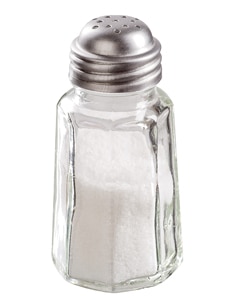With its permanent place on your dinner table, salt is considered by many to be the sultan of seasonings. But which type is best?
Where does it come from?
Before making its way into that adorable cow-shaped shaker, the salt on your table was made from either halite (rock deposits) or brine (saltwater). These natural sources sometimes contain trace minerals, including magnesium, iron, sulfur and potassium.
Table salt, or sodium chloride, is processed and packaged for convenient mass consumption. It is typically iodized, meaning it’s fortified with iodine, a nutrient required for healthy thyroid function. It may also contain anti-caking agents (to prevent clumping and moisture), including magnesium carbonate, calcium silicate, calcium phosphate, magnesium silicate or calcium carbonate. Due to processing procedures, naturally occuring trace elements are generally not present in conventional table salt.
Sea salt
Derived from evaporated seawater, sea salt contains roughly 98% sodium chloride and 2% various trace minerals retained from its natural source. Sea salt is minimally processed (if at all) and doesn’t contain anti-caking additives. Many chefs and foodies prefer the texture and less pungent taste of sea salt for sprinkling on certain dishes — however, it tends to lose flavor if added too early in cooking.
Rock salt
Mined from halite, rock salt is actually the product of evaporated saltwater (much like sea salt), although this evaporation process occured naturally over many, many years. Natural salt beds have been discovered in the U.S., Canada, the U.K. and Pakistan. Rock salt has many uses, including as an industrial deicer. One of the most popular natural rock salts for cooking is Himalayan pink salt, derived from ancient sea beds deep within the Himalayan mountains.
Kosher salt
Like sea salt, kosher salt is unrefined and comes in larger crystals perfect for curing meats, cooking with salt crusts and adding to glass rims (margarita, anyone?). Kosher salt has a distinct taste that may be preferred by some palates.
Which salt is best?
Unrefined salt (including sea salt and rock salt) may contain small amounts of minerals and doesn’t contain chemical additives, making it a smart choice to season meals. But, these salts are usually more expensive. Depending on your health needs and taste preferences, you should choose the salt that’s right for you. Because excess salt can dehydrate your body and interfere with existing health conditions, be sure to use it in moderation.

